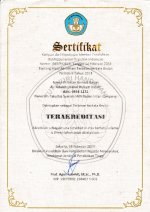Husein Muhammad’s Thoughts on Gender Equality in Islamic Inheritance Law
Abstract
This research aims to analyze the philosophical reasons for Husein Muhammad's thoughts about the importance of the equal distribution of inheritance between men and women in Islamic inheritance law, as well as the method of legal reform that he uses when understanding verses about inheritance. This research is field research. Data was collected through virtual interviews. Data analysis was descriptive qualitative, with maslahah theory, and historical and sociological approaches. The research findings show that one of the reasons why verses about inheritance need to be reinterpreted, according to Husein, is because these verses fall into the category of mutashabihat verses (interpretable) so they need to be reinterpreted by looking at the current context. Another reason is that the inheritance verses that regulate section 2:1 for men and women in the Prophet's era were only intended for the context of society at that time, where women had no inheritance rights, and even women were used as objects of inheritance. Nowadays, the existence of women is growing. That way the portion of their inheritance should be reformed and adapted to current socio-cultural developments. Husein emphasized that gender bias occurs due to bias when interpreting the Qur’an, and the influence of patriarchal culture.
Keywords
Full Text:
PDFReferences
Abu Abdillah Muhammad bin Abdurrahman ad- Dimmasyqi. Rahmat Al-Ummah Fi Ikhtilafi al-Aimmah. Qatar: Syeikh Khalifah bin HAmid Alu Tsani, 1981.
Amalia, Endah Amalia. “Penyetaraan Gender Dalam Hal Pembagian Warisan.” Ahkam: Jurnal Hukum Islam 8, no. 2 (November 19, 2020): 213–32. https://doi.org/10.21274/ahkam.2020.8.2.213-232.
Anderson. "Law Reform in The Muslim Word Cambridge." In Law Reform in The Muslim Word Cambridge. London: Athlon Press University, 1976.
Aniroh, Reni Nur. “Mempertegas Ide Kesetaraan Gender Dalam Sistem Kewarisan Bilateral.” al- Ahwal 13, no. 2 (2020): 119–38.
Dian Furqani Tenrilawa, Aminuddin, Rahman Subha, Anugrah Reskiani. “Reform Methods of Islamic Inheritance Law in Indonesia in Jurisprudence.” Jurnal Juris, 1, 21 (January 2022): 39–51.
Eni Zulaiha. “Analisa Gender Dan Prinsp-Prinsip MPenafsiran Husein MUhammad Pada Ayat-Ayat Relasi Gender.” Jurnal Al Bayan 3, no. 1 (June 2018).
Faqihuddin Abdul Kadir. Qiraah Mubadalah, Tafsir Progresif Untuk Keadilan Gender Dalam Islam. Yogyakarta: IRCiSoD, 2019.
Gustika Sandra Jumra, Sakti Yadi, and Tarmiz. “The Dynamics Of Determining Men And Women Parts In Matters Of Inheritance: A Study Of Islamic Law.” Jurnal Diskursus Islam Volume 10, no. 2 (Agustus 2022). https://doi.org/file:///D:/2022/AL%20ADALAH%20HUSEIN/Waris%20maslahah.pdf.
H.R. Otje Salman S. Hukum Waris Islam. Bandung: Aditama, 2006.
Husein Muhammad. Fikih Perempuan, Reflexi Kiyai Atas Wacana Agama Dan Gender. II. Yogyakaarta: LKIS, 2019.
———. Islam Agama Ramah Perempuan, Pembelaan Kiay Pesantern. Yogyakarta: LKIS, 2004.
———. Keadilan Perspektif Jender dalam Hukum Kewarisan Islam, Agustus 2020.
Husein Muhammad, Perempuan, Islam & Negara: Pergulatan Identitas Dan Entitas. Yogyakarta: IRCiSoD, Januari 22.
Kususiyanah, Anjar. “Keadilan Gender Dalam Kewarisan Islam: Kajian Sosiologis Historis.” Al Mazahib: Jurnal perbandingan Hukum 9, no. 1 (2021): 20.
———. “Keadilan Gender Dalam Kewarisan Islam: Kajian Sosiologis Historis” 9, no. 1 (2021): 20.
M. Nuruzzaman. Kiyai Husein Membela Perempuan. Yogyakarta: Pustaka Pesantren, 2005.
Muhammad Iqbal Juliansyahzen, Ansori. “The Contestation of the Family Law Discourse in the Digital Age: Islam, State, and Gender.” Samarah 6 (n.d.).
Murtadlo, Muhammad Ali. “Keadilan Gender Dalam Hukum Pembagian Waris Islam Perspektif The Theory Of Limit Muhammad Syahrur.” International journal of Child and Gender Studies 4, no. 1 (2018): 16.
Nasariddin Umar. Ketika Fikih Membela Perempuan. JAkarta: PT. ELX Media Compotindo, 2014.
Nasaruddin Umar. Argumen Kesetaraan Jender Perspektif Al Qur’an. Jakarta: Paramadina, 2001.
Nasution, Khoiruddin. “Metode Pembaruan Hukum Keluarga Islam Kontemporer.” Unisia 30, no. 66 (October 25, 2007): 329–41. https://doi.org/10.20885/unisia.vol30.iss66.art1.
Sugiri Permana. “Kesetraan Gender Dalam Ijtihad Hukum Waris Di Indonesia.” Jurnal As-Syar’iyyah 20, no. 2 (2018).
Syekh al-Imam Muhammad bin Ali bin Muhammad Asy Syaukani. Nail Al-Autar Min Ahadisi Sayyidi al-Ahyar Sarh Muntaqa al-Akhbar. Vol. 4. Beirut Libanon: Daar al Qutub al-Ilmiah, 1973.
Titik Hamidah. Fikih Perempuan Berwawasan Keadilan Gender. Malang: UIN Maliki Press, 2011.
Yusuf Rahman, Yusuf Rahman. “Feminist Kyai, KH Husein Muhammad, The Feminist Interpretation on Gendered Verses and the Qur’ā n-Based Activism.” Al-Jami’ah: Journal of Islamic Studies 55, no. 2 (2017): 293-326. https://doi.org/: 10.14421/ajis.2017.552.
DOI: http://dx.doi.org/10.24042/adalah.v19i2.13123
Refbacks
- There are currently no refbacks.
Copyright (c) 2022 Al-'Adalah
Al-'Adalah is licensed under a Creative Commons Attribution-ShareAlike 4.0 International License.



.png)
_(1).png)
_(1).png)

.png)
